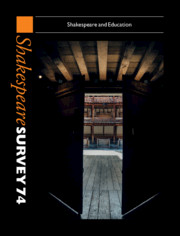Book contents
- Shakespeare Survey 74
- Shakespeare Survey
- Shakespeare Survey 74
- Copyright page
- Editor’s Note
- Contributors
- Contents
- Illustrations
- Whither Goest Thou, Public Shakespearian?
- Teaching Shakespeare in a Time of Hate
- Playful Pedagogy and Social Justice: Digital Embodiment in the Shakespeare Classroom
- Digital Resources, Teaching Online and Evolving International Pedagogic Practice
- Teaching Shakespeare with Performance Pedagogy in an Online Environment
- PPE for Shakespearians: Pandemic, Performance and Education
- ‘In India’: Shakespeare and Prison in Kolkata and Mysore
- Shakespeare for Cops
- Younger Generations and Empathic Communication: Learning to Feel in Another Language with Shakespeare at the Silvano Toti Globe Theatre in Rome
- Shakespeare in Nineteenth-Century Bengal: An Imperative of ‘New Learning’
- Forging a Republic of Letters: Shakespeare, Politics and a New University in Early Twentieth-Century Portugal
- Cultural Inclusivity and Student Shakespeare Performances in Late-Colonial Singapore, 1950–1959
- Using Performance to Strengthen the Higher Education Sector: Shakespeare in Twenty-First-Century Vietnam
- Counterpublic Shakespeares in the American Education Marketplace
- Taking Love’s Labour’s Lost Seriously
- The Thyestean Language of English Revenge Tragedy on the University and Popular Stages
- Going to School with(out) Shakespeare: Conversations with Edward’s Boys
- Intimacy and Schadenfreude in Reports of Problems in Early Modern Productions
- The True Tragedy as a Yorkist Play? Problems in Textual Transmission
- Henry VIII and Henry IX: Unlived Lives and Re-written Histories
- ‘And His Works in a Glass Case’: The Bard in the Garden and the Legacy of the Shakespeare Ladies Club
- Hamlet and John Austen’s Devil with a (Dis)pleasing Shape
- Shakespeare, #MeToo and his New Contemporaries
- ‘While Memory Holds a Seat in this Distracted Globe’: A Look Back at the Arden Shakespeare Third Series (1995–2020)
- Shakespeare Performances in England, 2020
- The Year’s Contribution to Shakespeare Studies
- ABSTRACTS OF ARTICLES IN SHAKESPEARE SURVEY 74
- Index
‘In India’: Shakespeare and Prison in Kolkata and Mysore
Published online by Cambridge University Press: 28 August 2021
- Shakespeare Survey 74
- Shakespeare Survey
- Shakespeare Survey 74
- Copyright page
- Editor’s Note
- Contributors
- Contents
- Illustrations
- Whither Goest Thou, Public Shakespearian?
- Teaching Shakespeare in a Time of Hate
- Playful Pedagogy and Social Justice: Digital Embodiment in the Shakespeare Classroom
- Digital Resources, Teaching Online and Evolving International Pedagogic Practice
- Teaching Shakespeare with Performance Pedagogy in an Online Environment
- PPE for Shakespearians: Pandemic, Performance and Education
- ‘In India’: Shakespeare and Prison in Kolkata and Mysore
- Shakespeare for Cops
- Younger Generations and Empathic Communication: Learning to Feel in Another Language with Shakespeare at the Silvano Toti Globe Theatre in Rome
- Shakespeare in Nineteenth-Century Bengal: An Imperative of ‘New Learning’
- Forging a Republic of Letters: Shakespeare, Politics and a New University in Early Twentieth-Century Portugal
- Cultural Inclusivity and Student Shakespeare Performances in Late-Colonial Singapore, 1950–1959
- Using Performance to Strengthen the Higher Education Sector: Shakespeare in Twenty-First-Century Vietnam
- Counterpublic Shakespeares in the American Education Marketplace
- Taking Love’s Labour’s Lost Seriously
- The Thyestean Language of English Revenge Tragedy on the University and Popular Stages
- Going to School with(out) Shakespeare: Conversations with Edward’s Boys
- Intimacy and Schadenfreude in Reports of Problems in Early Modern Productions
- The True Tragedy as a Yorkist Play? Problems in Textual Transmission
- Henry VIII and Henry IX: Unlived Lives and Re-written Histories
- ‘And His Works in a Glass Case’: The Bard in the Garden and the Legacy of the Shakespeare Ladies Club
- Hamlet and John Austen’s Devil with a (Dis)pleasing Shape
- Shakespeare, #MeToo and his New Contemporaries
- ‘While Memory Holds a Seat in this Distracted Globe’: A Look Back at the Arden Shakespeare Third Series (1995–2020)
- Shakespeare Performances in England, 2020
- The Year’s Contribution to Shakespeare Studies
- ABSTRACTS OF ARTICLES IN SHAKESPEARE SURVEY 74
- Index
Summary
Shakespeare claims a significant place in pedagogical and performative environments of many kinds, including an increasing number of correctional facilities. As the increasing number of book and articles focused on Shakespeare in Prison describe, textual and performative engagement with this drama offers thematic resonances, while supporting physical, emotional and intellectual development; and opportunities to engage in communal activities for people who have often experienced more trauma than success in their previous lives. Thanks to the virtual Shakespeare in Prison Network and the biennial Shakespeare in Prison conference, many international prison practitioners, current programme participants and alumni are forging strong ties that help individual groups to create programming, share strategies and gain the confidence built through common pursuits. These bonds have been particularly important during the COVID-19 pandemic, when many face-to-face meetings were cancelled, particularly in correctional spaces, since these environments often breed widespread infection. Virtual associations, therefore, have provided valuable opportunities to geographically distanced Shakespeare in Prison practitioners, eager for community during challenging times. Connections between far-flung Shakespeare and Prison programmes have only recently begun to encompass India, however.
- Type
- Chapter
- Information
- Shakespeare Survey 74Shakespeare and Education, pp. 98 - 110Publisher: Cambridge University PressPrint publication year: 2021



